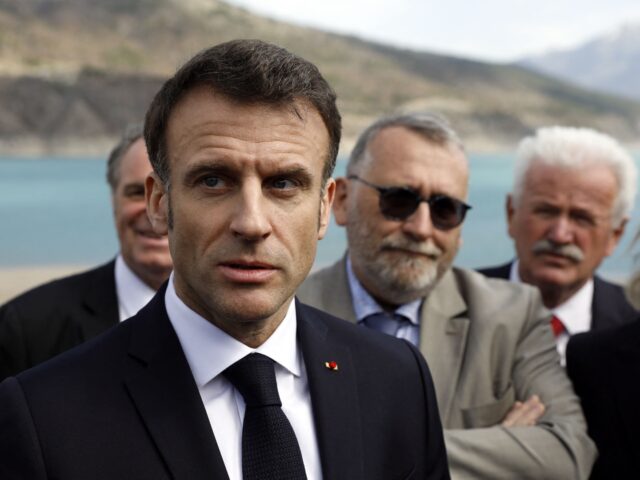The French people’s confidence in the leadership of President Emmanuel Macron has fallen to the lowest level since the Yellow Vest protests in 2018, as Marine Le Pen’s populists and far-leftists rise, amid the national crisis surrounding the government’s push to ram through pension reforms without a vote earlier this month.
According to a Kantar Public-Epoka poll conducted on behalf of the Le Figaro newspaper President Macron has seen his confidence rating among the public fall to just 26 per cent, dropping four points in just the last two months. This represents the lowest rating for the globalist leader since he was re-elected last year and the lowest since the Yellow Vest protests of 2018.
The survey went on to find that the number of citizens who do not trust Macron rising from 57 to 70 per cent. Perhaps most damming of all, there was a nine point increase over the past month in those who say they “do not trust him at all” as president, representing 50 per cent of those polled.
This was again the highest recorded figure since the Yellow Vest uprising in April of 2018 — in response to Macron’s attempts to impose hefty carbon taxes — when 57 per cent felt the same. However, Macron is still far off from reaching the heights of distrust seen against former President François Hollande in 2015 when 60 per cent of the country rejected his leadership outright.
Paris Burns… Hundreds Arrested as Rioters Set Trash Fires, Clash with Cops After Macron Tries to Pass Pension Reform Without a Vote https://t.co/3XUcsc6hQf
— Breitbart London (@BreitbartLondon) March 17, 2023
The drop in confidence in Macron — just one year into his second term — comes amid nationwide chaos, with millions of people protesting throughout the country, which radicals have used as an opportunity to riot, loot businesses, and set garbage fires in cities, including Paris, which have see thousands of tonnes of trash buildup as union trash collecting workers walked off the job. There have also been widespread shortages of fuel at the pump, with refinery workers striking and even staging blockades to prevent petrol being shipped out to service stations.
While the strikes and protests began last Summer amid the cost of living, inflation, and energy crises gripping the country as a result of the Chinese coronavirus lockdowns, supply chain issues, and the war in Ukraine, the protest began to ramp up in January as Macron’s government pressed forward with plans to raise the pension retirement age from 62 to 64-years-old.
The tipping point came this month when Macron’s top deputy in the National Assembly, Prime Minister Elisabeth Borne — who has seen her confidence ratings fall by 6 per cent to just 21 per cent — used a article 49.3 of the constitution to pass through the reforms without a vote after it became clear there was not majority support for the move, which sparked widespread fury at the government.
The use of the anti-democratic tactic to pass the raise of the pension age — which has been seen as an attack on the working class — has confirmed in the minds of many, on both the left and right in France that the globalist government of Macron is only interested in protecting the interests of the elites, many of whom saw their bank balances balloon while the nation has struggled under economic hardship — caused in large part by the policies of the Élysée Palace un Macron.
Fiery Paris Protests Continue as Nation Revolts Against Macron’s Globalist Government https://t.co/FIsrtvA8cP
— Breitbart London (@BreitbartLondon) March 29, 2023
Though he was re-elected last year to a second term, his challenger in the race, right-wing populist firebrand Marine Le Pen surged to 41.5 per cent of the vote, largely off the back of gains among younger millennials and working-class voters disenfranchised by Macron’s globalist agenda. Two months later, Macron saw his majority in the National Assembly evaporate and was forced into forming a coalition with the centre-right Les Republicains to maintain a working majority in the parliament. The elections also saw Marine Le Pen’s National Rally (RN) sweep to a surprising result, with a historic 89 RN candidates elected to the National Assembly.
The crisis over the pension reforms has seemingly been a boon to the populist party, with Le Pen’s former deputy and current National Rally party president Jordan Bardella, 27, seeing the steepest gains in support from the public of any political figure, jumping six points in the Le Figaro poll to 29 per cent in terms of preferences for future political leaders. Meanwhile, Le Pen has also gained two points to 39 per cent, only slightly trailing Macron’s former deputy and current Mayor of Le Havre Édouard Philippe.
The poll also saw an upswing in support for Fabien Roussel, 53, who has served as the head of the French Communist Party (PCF) since 2018. Gaining three points in the rankings to 22 per cent, the communist politician has now overtaken failed far-left presidential candidate Jean-Luc Mélenchon, 71, who, despite actively stoking the latest protest movement has seen his confidence rating drop by a point to 18 per cent.
Going forward, it remains to be seen if Macron will be able to keep his coalition in the National Assembly together, with many members of the Les Republicains jumping ship on his pension reforms, and even some joining failed efforts to pass a vote of no-confidence vote against his government earlier this month. Whether or not his government is able to withstand the current crisis, it appears that Macron’s hopes of ascending to the position of top dog in Europe following the retirement of German Chancellor Angela Merkel have likely been dashed.
Jupiter Falling? Macron Govt in Jeopardy as Opposition Parties File Motions of No Confidence https://t.co/ItMfGvByjW
— Breitbart London (@BreitbartLondon) March 18, 2023
Follow Kurt Zindulka on Twitter here @KurtZindulka

COMMENTS
Please let us know if you're having issues with commenting.